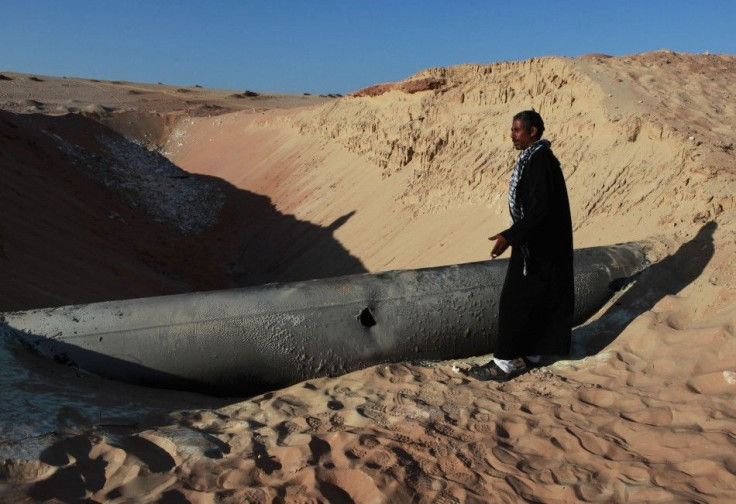Israeli PM Netanyahu Denies Cancelled Egypt Gas Deal Prompted By Politics

Israeli Prime Minister Benjamin has shrugged off Egypt’s decision to terminate a gas contract with Israel, citing that the cancellation did not arise from political or diplomatic disagreements between the two nations and that the Jewish State can develop its own gas reserves.
Moreover, the Prime Minister said the spat arose from business disputes between the private companies involved in the deal.
Similarly, Egypt's oil minister, Abdullah Ghorab, said the cancellation does not go beyond a commercial dispute and is not governed by any political considerations.”
On Sunday evening, Mohamed Shoeb, head of the state-owned Egyptian Natural Gas Holding Co. (EGAS) said the company will terminate its pact to provide natural gas to Israel.
Ampal-American Israel Corp. which owns a 12.5 percent share in East Mediterranean Gas Co. (EMG), the joint venture company which operates the cross-border pipeline, said in a statement that: EMG… considers the termination attempt unlawful and in bad faith, and consequently demanded its withdrawal… EMG, Ampal and EMG's other international shareholders are considering their options and legal remedies as well as approaching the various governments.
About 40 percent of Israel’s natural gas imports come from Egypt, mostly at below-market prices.
Egypt's ambassador to Israel Yasser Rida echoed Netanyahu’s assertion that the cancellation did not stem from political strife, in view of some of the anti-Israeli rhetoric embraced by the new government in Cairo that toppled the former leader, pro-Israel president Hosni Mubarak.
Israel’s Deputy Foreign Minister Danny Ayalon, who met with Rida on Monday, said he expects Cairo officials to resolve the dispute in order to help maintain stability in the region.
However, there is great confusion over why Egypt terminated the gas deal.
According to the Haaretz newspaper, Israeli security officials said that Egypt has provided no specific reason behind the cancellation, and that top Cairo government officials would neither confirm nor deny the termination.
Haaretz speculates that the current ruling entity in Egypt, the Supreme Military Council, might not even have been aware of EGAS’ decision due to the instability in the country ahead of what are expected to be chaotic presidential elections. The Council has yet to even comment on the gas deal.
Shoeb himself told al-Jazeera television that the decision to cancel the pact came after EMG fell months behind in its payments for natural gas.
Israel has denied that allegation and warned that cancellation of the gas deal may violate terms of the historic 1979 peace treaty between the two nations.
Avigdor Lieberman, Israel’s foreign minister, complained to Israeli radio that the cancellation was not a good sign. We want to understand this as a trade dispute. I think that to turn a business dispute into a diplomatic dispute would be a mistake. Israel is interested in maintaining the peace treaty and we think this is also a supreme interest of Egypt.”
At least one top Israeli official is alarmed by the cancelation.
Israeli Finance Minister Yuval Steinitz said the severed deal sets a dangerous precedent which casts a shadow on the peace agreements and the peaceful atmosphere between Egypt and Israel.
The gas deal between Egypt and Israel has long been controversial in the Arab country. Pipelines in the Sinai carrying gas to Israel have often been the target of attacks, bombings and sabotage.
The disrupted gas deliveries have led to electric shortages and rolling blackouts in Israel.
Mubarak was strongly in favor of the gas contract which was signed in 2005 at a term of 20 years. Interestingly, Hussein Salem, a former Mubarak associate and prominent stakeholder in EMG, is now on trial in absentia facing a litany of corruption charges, including some related to the Israel gas deal, Reuters noted.
Egyptian officials have also complained that the gas deal was at terms disadvantageous to Cairo.
Tamer Abu Bakr, the chairman of Genco Group, an Egyptian natural gas distribution company, told the Wall Street Journal: The big saying here in Egypt is that we are subsidizing the Israeli people while we are not subsidizing the Egyptians.”
Yolande Knella, a BBC correspondent in Jerusalem, said termination of the gas contract, should it be permanent, would have grave consequences for Israel.
“Since President Hosni Mubarak, an advocate of the [gas] deal, was ousted last year, relations between the two countries have deteriorated,” she wrote.
“The latest development is another reminder that ties are unlikely to improve soon. Israel is worried about the rise of Islamists in Egypt and a new confidence among its general public about expressing anti-Israeli views.”
© Copyright IBTimes 2024. All rights reserved.





















